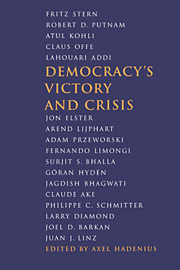Book contents
- Frontmatter
- Contents
- List of contributors
- Acknowledgments
- 1 Victory and crisis: introduction
- Part 1 Historical perspectives
- Part 2 Social and cultural aspects
- Part 3 Constitutional questions
- Part 4 Democracy and development
- Part 5 Democracy and globalization
- 12 Globalization, sovereignty, and democracy
- 13 Dangerous liaisons: the interface of globalization and democracy
- 14 Exploring the problematic triumph of liberal democracy and concluding with a modest proposal for improving its international impact
- Part 6 Promoting democracy
- Index
12 - Globalization, sovereignty, and democracy
Published online by Cambridge University Press: 13 October 2009
- Frontmatter
- Contents
- List of contributors
- Acknowledgments
- 1 Victory and crisis: introduction
- Part 1 Historical perspectives
- Part 2 Social and cultural aspects
- Part 3 Constitutional questions
- Part 4 Democracy and development
- Part 5 Democracy and globalization
- 12 Globalization, sovereignty, and democracy
- 13 Dangerous liaisons: the interface of globalization and democracy
- 14 Exploring the problematic triumph of liberal democracy and concluding with a modest proposal for improving its international impact
- Part 6 Promoting democracy
- Index
Summary
Introduction
Like everyone else, economists like to break out of the narrowness of their discipline and speculate on a larger theme, painting on a bigger canvas. Like John Kenneth Galbraith, they may even make money while having fun. In the process, they may even illuminate and inform, doing good while doing well.
The task I have been assigned is an intellectually challenging one: does the growing globalization of the world economy and the presumed growth then in interdependence promise to constrain national sovereignty; and, does it equally threaten to compromise democratic accountability within nation-states? I feel daunted by the task: it is both extremely broad in scope and at the same time inadequately amenable to conventional analysis within any discipline. My analysis, while grounded in my understanding of the globalization process that is ongoing, must therefore remain essentially speculative in character. Few such speculations, especially those that contain within them a prognosis of the future, have turned out, if the past is any guide, to stand the test of time (though, I derive comfort from the fact that the worth of an idea lies in what it stimulates, even if by provocation, even while it is itself wildly wrong).
Since a major element of the globalization process today is international trade and since we economists tend to think of international trade as essentially a technology (in the sense that it adds to one's productive potential yet another way of transforming goods into one another, via external exchange), the great failure of such speculation that comes to mind, of course, is that of the celebrated pessimists George Orwell and Aldous Huxley.
- Type
- Chapter
- Information
- Democracy's Victory and Crisis , pp. 263 - 281Publisher: Cambridge University PressPrint publication year: 1997
- 1
- Cited by

